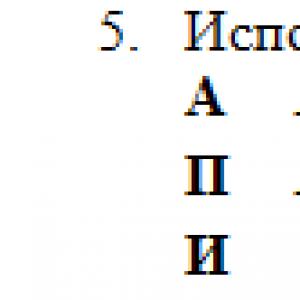Isolation of circumstances in the Russian language. Punctuation marks in isolated circumstances B) Circumstances expressed by nouns
The isolation (emphasis of commas) of circumstances depends, first of all, on the method of their expression.
A) Circumstances expressed by gerunds
1. Circumstances expressed by gerunds (you can ask morphological questions to the gerunds doing what? what did you do?) and participial phrases (that is, participles with dependent words), as a rule, are isolated regardless of the place they occupy in relation to the predicate verb:
Example: Arms spread wide, a grimy bulldozer driver is sleeping(Peskov). Ksenia had dinner spreading a scarf on the rod (Peskov).
If a circumstance expressed by a gerund and a participial phrase is in the middle of a sentence, then it is separated by commas on both sides:
And then to the cliff, leaving my bulldozer, Nikolai ran up(Peskov). The bird, shuddering, picked up its wings(Permitov).
Isolated circumstances, expressed by gerunds and participial phrases, are close in meaning to the secondary predicate (but are never independent predicates!). Therefore, they can be replaced by subordinate clauses or independent predicates.
Wed: And then to the cliff, leaving my bulldozer, Nikolai ran up. - Nikolai left his bulldozer and ran to the cliff. The bird, shuddering, picked up its wings. - The bird shuddered and picked up its wings.
Pay attention!
1) Restrictive particles are only included inside separate design and stand out along with it.
A match was struck only for a second illuminating the man's face.
2) The participle and the participial phrase standing after the coordinating or subordinating conjunction / allied word are separated from it by a comma (such a phrase can be torn off from the conjunction, rearranged to another place in the sentence, or removed from the sentence).
Wed: He threw down the pen and leaning back in the chair, began to look at the moonlit clearing(Permitov). - He dropped the pen and began to look at the moonlit clearing; Life is arranged in such a way that without knowing how to hate, it is impossible to sincerely love(M. Gorky). - Life is arranged in such a way that it is impossible to truly love, not knowing how to hate.
3) A conjunction or a conjunctive word is not separated by a comma from a gerund and a participial phrase in the event that the participial construction cannot be torn away from the conjunction or conjunctive word or removed from the sentence without destroying the structure of the sentence itself. This is most often observed in relation to coordinating conjunction A .
Wed: He tried to read books unnoticed, and after reading them, he hid them somewhere(impossible: He tried to read books unnoticed, but hid them somewhere); But: He did not name the author of the note, but, having read it, put it in his pocket. - He did not name the author of the note, but put it in his pocket.
Two homogeneous gerunds or participial phrases connected by single coordinating or disjunctive conjunctions and, or, or, are not separated by a comma.
The telephone operator sat, hugging his knees and leaning your forehead on them(Baklanov).
If the conjunction connects not two gerunds, but other constructions (predicates, parts complex sentence etc.), then commas are placed in accordance with the rules for placing punctuation marks for homogeneous members, in compound sentence etc.
Wed: 1. I took the note and, after reading it, put it in my pocket. Single conjunction and connects predicates ( took it and stuck it) and a comma is placed after the conjunction;
2. He stopped thinking about something, And , turning around sharply, called the sentry. A single conjunction connects two predicates ( stopped and called). Circumstances - participial phrases refer to different predicates ( stopped thinking about something; called, turning around sharply ). Therefore, they are separated on both sides by commas from other members of the sentence.
2. Not isolated circumstances expressed by gerunds and participial phrases, in the following cases:
The participial phrase is a phraseological unit:
He worked carelessly; He ran headlong.
Note. Most often the following phraseological units are not distinguished in texts: run headlong, run headlong, work carelessly, work with sleeves rolled up, work tirelessly, sit back, rush with your tongue out, listen with bated breath, scream without taking a breath, lie staring at the ceiling, rush about without remembering yourself, spend the night without closing your eyes, listen with your ears hanging open. But if such a phraseological unit is an introductory word ( in all honesty, to be honest, frankly speaking, in short, apparently), then it is separated by commas, for example: Apparently, he had no intention of helping me; In short, we will have to do everything ourselves.
before the gerund there is an intensifying particle and (not a conjunction!):
You can live and without bragging about your intelligence;
Pay attention!
The participle in modern Russian is never predicate, therefore verb and gerund cannot be homogeneous members!
The gerund is part of a subordinate clause and has the conjunctive word which as its dependent. In this case, a comma only separates the main clause from the subordinate clause, and there is no comma between the gerund and the conjunctive word:
We face the most difficult tasks, without deciding which we will not be able to get out of the crisis;
The participial phrase includes the subject.
In this case, the comma only separates the entire phrase from the predicate, and the subject and the gerund are not separated by a comma. Such constructions are found in poetic texts of the XIX century:
Crow perched on a spruce tree, had breakfast I'm just about ready...(Krylov); compare: Crow, perched on a spruce, got ready to have breakfast;
the participle acts as homogeneous member with a non-isolated circumstance and is connected with it by the conjunction and:
He walked quickly and without looking around.
3. Not isolated participle constructions and single participles that have lost their verbal meaning. These are the most difficult cases for punctuation analysis. They require special attention to the meaning of the gerund, to the context in which the gerund is used, etc.
Participles and adverbial phrases that have finally lost their verbal meaning, become adverbs, or acquired an adverbial meaning in a given context are not distinguished:
She looked at me without blinking(it is forbidden: looked and didn't blink); We drove slowly(it is forbidden: we drove and were in no hurry); The train was coming without stopping (it is forbidden: walked and didn't stop); He answered while sitting(it is forbidden: he answered and sat); He walked with his back bent(it is forbidden: he walked and bent).
Such single participles, less often - participial phrases, are usually circumstances of the manner of action (answer questions How? how?), merge with the predicate into one whole, are not separated from the predicate by a pause and most often stand immediately after the predicate:
looked silently, looked smiling, listened with a frown, spoke while yawning, chatted incessantly, sat ruffled, walked bent over, walked stumbling, walked with a limp, walked with his head bowed, wrote with his head bowed, entered without knocking, lived without hiding, spent money without counting etc.
Often such gerunds can be replaced by adverbs, nouns with and without prepositions.
Wed: He spoke about this smiling. - He spoke about this with a smile; The train was coming without stopping. - The train went without stops.
In all such uses, the gerund indicates not an independent action, but an image of the action expressed by the predicate.
For example, in the sentence: He walked bent over- one action ( walked), and the former gerund ( bent over) indicates a mode of action - a characteristic posture when walking.
If in this context the verbal meaning is preserved, then a single gerund or participial phrase is isolated. Usually in this case there are other circumstances with the predicate verb; The participle acquires the meaning of clarification, explanation and is intonationally highlighted.
Wed: He walked without looking back. - He walked hastily, without looking back.
The increase in verbosity in gerunds can be facilitated by the degree of prevalence of gerunds.
Wed: She sat waiting. - She sat waiting for an answer.
Not isolated former gerunds that have lost connection with the verb and have become function words: starting from (meaning “from such and such a time”), proceeding from (meaning “based on”), depending on (meaning “in accordance”) :
Everything has changed since last Monday; The estimate is based on your calculations; Act depending on the circumstances.
However, in other contexts the turns may become isolated:
turns with words starting with are isolated if they are in the nature of clarification, explanation and are not associated with the concept of time:
The word beginning in such contexts cannot be eliminated without damaging the meaning of the sentence;
a phrase with the words proceeding from is isolated if in meaning it correlates with the producer of the action, which can “come from something”:
We have drawn up an estimate based on your calculations (we based on your calculations);
turns with words, depending on the type, are isolated if they have the meaning of clarification or accession:
I had to act carefully, depending on the circumstances (clarification, you can insert “namely”); Vacation can be used to practice various sports, depending on the time of year (joining).
B) Circumstances expressed by nouns
1. Always separate circumstances of the assignment expressed by nouns with prepositions despite, despite. Such phrases can be replaced by subordinate clauses of concession with the conjunction although.
Wed: Despite the rainy summer, the harvest turned out to be excellent(Pochivalin). - Although the summer was rainy, the harvest was excellent; Despite heavy shelling, Fedyuninsky rose to his observation post. - Although the shelling was strong, Fedyuninsky rose to his observation post.
2. Can become isolated circumstances:
reasons with prepositions and prepositional combinations thanks to, as a result of, in view of, for lack of, for the absence of, according to, by virtue of, in connection with, for the reason of, on occasion etc. (can be replaced subordinate clause with the conjunction since).
Wed: Savelich, agrees with the coachman's opinion, advised to return. - Since Savelich agreed with the coachman’s opinion, he advised to turn back; Children, due to being young, no positions have been identified(Turgenev). - Since the children were small, they were not assigned any positions;
concessions with prepositions in spite of, with (can be replaced with a subordinate clause with the conjunction although).
Wed: His life despite the gravity of his situation, went easier, slimmer than Anatole’s life(Herzen). - Although the situation was difficult, his life was easier, more harmonious than Anatole’s life; Contrary to his instructions, the ships were put out to sea early in the morning(Fedoseev). - Although he gave instructions, the ships were taken out to sea early in the morning.
conditions with prepositions and prepositional combinations if present, if absent, in case etc. (can be replaced by a subordinate clause with the conjunction if).
Wed: workers, in case of refusal, decided to go on strike. - If the workers are refused, they decide to go on strike;
goals with prepositions and prepositional combinations in order to avoid (can be replaced by a subordinate clause with the conjunction so that).
Wed: Money, to avoid delay, translate by telegraph. - To avoid delays, transfer money by telegraph;
comparisons with the conjunction like.
Wed: Nikolai Petrovich was born in the south of Russia, like his older brother Pavel (Turgenev).
However, phrases with such prepositions and prepositional combinations may not be isolated.
More often, phrases that are located between the subject and the predicate are isolated:
Savelich, agrees with the coachman's opinion, advised to return.
In addition, isolated phrases are usually common, that is, they contain a noun with dependent words:
Thanks to great weather and especially holiday, the street of the village of Maryinsky came alive again(Grigorovich).
As a rule, the indicated phrases at the end of the sentence are not isolated.
Wed: workers, as directed by the master, headed to the next workshop. - The workers went to the neighboring workshop as directed by the master.
In general, the isolation of phrases with the indicated prepositions and prepositional combinations is optional.
3. Circumstances expressed by nouns, without prepositions or with other prepositions, are isolated only if they acquire additional semantic load, have an explanatory meaning or combine several adverbial meanings (temporary and causal, temporary and concessional, etc.).
For example: Petya, after he received a decisive refusal, went to his room(L. Tolstoy).
In this case, the circumstance combines the meanings of time and reason ( when did you leave? And why did you leave?). Please note that the phrase is expressed by a noun with dependent words and is located between the subject and the predicate.
Pay attention!
Isolated circumstances expressed by nouns are always highlighted intonationally. However, the presence of a pause does not always indicate the presence of a comma. Thus, the circumstances that appear at the beginning of the sentence are always emphasized intonationally.
Wed: I was in St. Petersburg last year; Last year / I was in St. Petersburg.
However, a comma is not placed after such a circumstance!
C) Circumstances expressed by adverbs
Circumstances expressed by adverbs (with dependent words or without dependent words) are isolated only if the author wants to draw attention to them, if they have the meaning of a passing comment, etc.:
A moment later into the yard, unknown where from, a man ran out in a nankeen caftan, with a head as white as snow(Turgenev).
Since the participial phrase is a separate circumstance, most often in a sentence it is separated on both sides by commas. However, there are exceptions to this rule. This article describes in detail all the nuances of using the participial phrase.
How is the adverbial phrase marked in writing?
Participial phrase is a participle with dependent words. In a sentence, it expresses the meaning of an additional action and plays the syntactic role of a separate circumstance. As a rule, in sentences with participial phrases, commas distinguish a separate speech structure on both sides.
Features of the use of participial phrases:
- At the beginning of the sentence, the adverbial phrase is separated by only one comma - at the end of the phrase. In addition, it must be taken into account that the participial phrase before the word being defined (the verb to which it refers) usually names the action that preceded the action called the verb.
Examples: Having solved the problem, I went for a walk. Picking apples, grandma made jam.
- At the end of the sentence, the adverbial phrase is separated by a comma only at the beginning of the phrase. A participial phrase after a predicate verb usually indicates a simultaneous or subsequent action.
Examples: I drank tea admiring the sunrise. He fell sprained my leg.
- In the middle of a sentence, the participial phrase is highlighted by commas on both sides and can be used both before and after the predicate verb.
Examples: Kate, having prepared breakfast, set the table. The man was riding on the bus listening to music, and remembered yesterday's conversation.
In what cases is the adverbial phrase not separated by commas?
The participial phrase without commas is used in the following cases.
Separation (separated by commas) circumstances depends, first of all, on the way they are expressed.
A) Circumstances expressed by gerunds
1. Circumstances expressed by gerunds, as a rule, are isolated regardless of the place they occupy in relation to the predicate verb:
For example: A grimy tractor driver is sleeping with his legs spread wide. Maria had dinner, spreading the tablecloth on the table.
If a circumstance expressed by a gerund and a participial phrase is in the middle of a sentence, then it is separated by commas on both sides:
For example: And then Ivan ran up to the river, leaving his tractor. The caterpillar, shuddering, pressed its paws.
Isolated circumstances, expressed by gerunds and participial phrases, are close in meaning to the secondary predicate, but they are never independent predicates! Therefore, they can be replaced by subordinate clauses or independent predicates.
For example: And then Ivan ran up to the river, leaving his tractor. – Ivan left his tractor and ran to the river. The caterpillar, shuddering, pressed its paws. – The caterpillar shuddered and pressed its paws.
1) Restrictive particles are only included inside a separate structure and are released along with it.
A spark flashed, illuminating the woman's face only for a second.
2) The participle and the participial phrase standing after the coordinating or subordinating conjunction / allied word are separated from it by a comma. Such a phrase can be torn away from the conjunction, rearranged to another place in the sentence, or removed from the sentence.
For example: She threw down her pencil and, leaning back in her chair, began to look out the window. “She threw down her pencil and began to look out the window;
3) The conjunction, allied word is not separated by a comma with the gerund and participial phrase in the event that the participial construction cannot be separated from the conjunction, allied word, or removed from the sentence without destroying the structure of the sentence itself. This is most often observed in relation to the coordinating conjunction "a".
For example: He tried to write letters unnoticed, and after writing, he hid them somewhere (impossible: He tried to write letters unnoticed, but hid them somewhere); but: He did not name the author of the letter, but, having read it, put it in his pocket. – He did not name the author of the letter, but put it in his pocket.
Two homogeneous gerunds or participial phrases connected by single coordinating or disjunctive conjunctions and, or, or, are not separated by a comma.
The waitress sat with her arms wrapped around the chair and her head resting on it.
If a conjunction connects not two gerunds, but other constructions (predicates, parts of a complex sentence, etc.), then commas are placed in accordance with the rules for placing punctuation marks for homogeneous members, in a complex sentence, etc.
For example: 1. I took the candy and, after looking, put it in my pocket. A single conjunction connects the predicates (took and put) and a comma is placed after the conjunction;
2. He slowed down, thinking about something, and, turning around sharply, called the watchman. A single conjunction connects two predicates (stopped and called). Circumstances - participial phrases refer to different predicates (slowed down, thinking about something; called, turning around sharply). Therefore, they are separated on both sides by commas from other members of the sentence.
2. Circumstances expressed by gerunds and participial phrases are not isolated in the following cases:
An adverbial phrase is a phraseological unit:
For example: He ran headlong. He worked carelessly;
Note. Most often, the following phraseological units are not isolated in the texts: run headlong, work with your sleeves rolled up, work tirelessly, sit with your hands folded, work like a squirrel in a wheel, listen with bated breath, lie spitting at the ceiling, rush around without remembering yourself, spend the night without sleeping eyes, listen with open ears. But if such a phraseological unit is an introductory word (to be honest, frankly speaking, frankly speaking, in short, apparently), then it is separated by commas, for example: Apparently, he was not going to help me; In short, we will have to do it ourselves.
Before the gerund there is an intensifying particle and (not a conjunction!):
You can live without showing off your intelligence;
The gerund in modern Russian is never predicate, so the verb and the gerund cannot be homogeneous members!
The participle is part of a subordinate clause and has the conjunctive word which as its dependent. In this case, a comma only separates the main clause from the subordinate clause, and there is no comma between the gerund and the conjunctive word:
For example: You are faced with the most difficult tasks, without solving which we will not be able to get out of a difficult situation;
The participial phrase includes the subject.
In this case, the comma only separates the entire phrase from the predicate, and the subject and the gerund are not separated by a comma. Such constructions are found in poetic texts of the 19th century:
For example: A magpie perched on a spruce tree and was just about ready to have breakfast...; Example: A magpie, perched on a spruce tree, was about to have breakfast;
The participle acts as a homogeneous member with a non-isolated circumstance and is connected with it by the conjunction and:
For example: He walked quickly and without looking around.
3. Participle constructions and single participles that have lost their verbal meaning are not isolated. These are the most difficult cases for punctuation analysis. They require special attention to the meaning of the gerund, to the context in which the gerund is used, etc.
Participles and adverbial phrases that have finally lost their verbal meaning, become adverbs, or acquired an adverbial meaning in a given context are not distinguished:
For example: He looked at her without blinking (impossible: looked and did not blink); They drove slowly (impossible: they drove and were in no hurry); The bus walked without stopping (impossible: walked and did not stop); She answered standing (impossible: she answered and sat); He walked with his back straight (impossible: he walked with his back straight).
Such single participles, less often - participial phrases, are usually circumstances of the manner of action (answer the questions how? in what way?), merge with the predicate into one whole, are not separated from the predicate by a pause and most often stand immediately after the predicate:
For example: looked silently, looked smiling, listened with a frown, chatted without ceasing, walked bent over, walked stumbling, walked with a limp, sat with a ruff, walked with his head bowed, wrote with his head bowed, entered without knocking, lived without hiding, spent money without counting etc. .d
Often such gerunds can be replaced by adverbs, nouns with and without prepositions.
For example: He spoke about it angry. - He spoke about it with anger;
In all such uses, the gerund indicates not an independent action, but an image of the action expressed by the predicate.
For example, in the sentence: He walked upright - there is one action (walked), and the former gerund (straightened) indicates the mode of action - a characteristic posture when walking.
If in this context the verbal meaning is preserved, then a single gerund or participial phrase is isolated. Usually in this case there are other circumstances with the predicate verb; The participle acquires the meaning of clarification, explanation and is intonationally highlighted.
For example: He walked without stopping. “He walked hurriedly, without stopping.
The increase in verbosity in gerunds can be facilitated by the degree of prevalence of gerunds.
For example: He sat waiting. – He sat waiting for an answer.
Former gerunds that have lost connection with the verb and have become function words are not isolated: starting from (meaning “from such and such a time”), proceeding from (meaning “based on”), depending on (meaning “in accordance with "):
For example: Everything has changed since last Tuesday; the report is compiled based on your data;
However, in other contexts the phrases can be isolated:
Isolation of circumstances
A turn of phrase starting with is isolated if it is in the nature of clarification, explanation and is not associated with the concept of time:
For example: This is confirmed by the history of many countries, starting with England and the USA;
The word beginning in such contexts cannot be eliminated without damaging the meaning of the sentence;
A phrase with words proceeding from is isolated if its meaning correlates with the producer of the action, which can “come from something”:
For example: We compiled a report based on your data (we based on your data);
A turn of phrase with words, depending on one, is isolated if it has the meaning of clarification or accession:
For example: We had to act selectively, depending on the circumstances (clarification, you can insert “namely”); depending on the time of year (annexation).
B) Circumstances expressed by nouns
1. The circumstances of the concession, expressed by nouns with the prepositions “despite”, “despite”, are always isolated. Such phrases can be replaced by subordinate clauses of concession with the conjunction although.
For example: Despite the cold spring, the harvest turned out to be excellent. – Although the spring was rainy, the harvest turned out to be excellent;
2. The following circumstances may be isolated:
Reasons with prepositions and prepositional combinations such as: thanks to, for lack of, as a result of, in view of, for lack of, according to, by virtue of, in connection with, due to, on occasion, etc. (can be replaced by a subordinate clause with the conjunction since).
For example: Petrovich, in agreement with the opinion of the boss, advised to return. - Since Petrovich agreed with the boss’s opinion, he advised him to return; The children, due to their young age, were not given any work. – Since the children were small, they were not given any work;
Concessions with prepositions in spite of, with (can be replaced with a subordinate clause with the conjunction although).
For example: His life, despite all his misfortunes, was easier than Anton’s life. – Although the situation was difficult, his life was easier than Anton’s;
Conditions with prepositions and prepositional combinations in the presence, in the absence, in the case, etc. (can be replaced by a subordinate clause with a conjunction if).
For example: The prisoners, in case of refusal, decided to go on a hunger strike. – If the prisoners are refused, they decided to go on a hunger strike;
Goals with prepositions and prepositional combinations in order to avoid (can be replaced by a subordinate clause with the conjunction so).
For example: to avoid damage, transport the goods by mail. – To avoid damage, transport the goods by mail;
Comparisons with the union are similar.
For example: Ivan Nikolaevich was born in the north of Russia, like his older brother Anton.
However, phrases with such prepositions and prepositional combinations may not be isolated.
More often, phrases that are located between the subject and the predicate are isolated:
Petrovich, in agreement with the boss’s opinion, advised them to return.
In addition, isolated phrases are usually common, that is, they contain a noun with dependent words:
Thanks to good weather and especially a holiday, our street became lively again.
As a rule, the indicated phrases at the end of the sentence are not isolated.
For example: The prisoners, on the orders of the warden, went to their cells. - The prisoners went to their cells on the orders of the warden.
In general, the isolation of phrases with the indicated prepositions and prepositional combinations is optional.
3. Circumstances expressed by nouns, without prepositions or with other prepositions, are isolated only if they acquire additional semantic load, have an explanatory meaning or combine several adverbial meanings. For example: temporary and causal, temporary and concessional, etc.
For example: Vova, after receiving a decisive refusal, went home.
In this case, the circumstance combines the meanings of time and reason and answers the questions: when did he leave? and why did you leave? The turnover is expressed by a noun with dependent words and is located between the subject and the predicate.
Isolated circumstances expressed by nouns are always highlighted intonationally. However, the presence of a pause does not always indicate the presence of a comma. Thus, the circumstances that appear at the beginning of the sentence are highlighted intonationally.
For example: I was in Moscow last year; Last year / I was in Moscow.
However, a comma is not placed after such a circumstance!
C) Circumstances expressed by adverbs
Circumstances expressed by adverbs (with dependent words or without dependent words) are isolated only if the author wants to draw attention to them or if they have the meaning of a passing comment.
For example: After some time, a boy in a white suit, with a head black as coal, ran out into the street, from nowhere.
They are always isolated, that is, separated by a comma, and in the middle of the sentence, circumstances expressed by the adverbial phrase are highlighted with commas (Tired of talking, he went out into the garden. The cat, seeing the dog, started running).
Single gerunds are almost always isolated (When leaving, turn off the light. Turn off the light when leaving). Only single gerunds that stand directly after the predicate verb, are closely related to it and do not stand out intonationally are not isolated, for example: Turn off the light when leaving. The boy walked with a limp. Tatyana loves seriously (A.S. Pushkin). Phraseological units that include gerunds are not isolated either: ran headlong, worked carelessly, listened with bated breath, did not sit idly by, etc.
As a rule (but not always), the circumstances of the assignment are isolated with pretexts despite, despite (Still, despite decision made, Maxim decided to see her again).
Circumstances are always isolated, playing the role of clarifying (There, across the river, the fog had already settled), explanatory (At that time, exactly a year ago, I met with him often) and connecting (Everywhere, including in the forest, it was hot) members offers. Clarifying circumstances must be distinguished from homogeneous and widespread circumstances.
Circumstances expressed in comparative terms are also isolated (He shuddered as if struck).
At the same time, it should be remembered that any circumstance can be isolated if the author wants to highlight it in a sentence, for example: And then he met her in the city garden and in the square, several times a day (A.P. Chekhov); And the silence, over time, became more and more ominous (M. Gorky).
The circumstances expressed by the adverbial phrase are always isolated, that is, separated by a comma, and in the middle of the sentence they are highlighted by commas.
Dubov, sitting astride a bench, was disassembling the revolver.
He again appeared at the door of the hut and, without saying a single word of greeting to us, said bluntly: “We should pull the Tarantas into the yard.”
Entering the classroom, the professor greeted the students.
A match struck, momentarily illuminating the hanging nets, the hay, the old man...
After taking a full look at his situation, he sighed.
And what are you ringing about on the merry day of May, shaking your head among the uncut grass?
If you had money, wouldn't you spend it?
Overripe stars hung in the greenish sky, touching the roofs.
The blizzard howled persistently and evenly, stocked with enormous tension somewhere in the steppes of the southeast.
The snowstorm subsided, turning into wet snowfall.
The Cossack officer, seeing the calmness of the artisans, was confused.
The shrapnel screamed low and, stopping mid-flight, angrily tore itself to pieces.
With difficulty lifting the heavy oars, the rowers began to slowly move away from the shore.
Breaking the thin ice of a small bay, the boat entered the lake.
Circumstances expressed by a single gerund are almost always isolated.
Victor turned away and smiled.
He, laughing, tried to hold her.
After thinking, the boy answered the question.
As she left, Katya kept turning around.
Grandmother, sighing, put a kerosene lamp on the table.
Stretching, Sergei yawned sweetly and got up from the sofa.
Vera, smiling, extended both hands to him.
Groaning, Ivan Petrovich began to collect fallen books from the floor.
Having rested, he prepared to leave.
He smiled and squinted from the light.
The circumstances of the assignment with the prepositions despite, despite, as a rule, are isolated.
Despite the precautions we took, rumors still spread.
Despite all our precautions, the news of Pugachev’s appearance spread throughout the fortress.
And yet, despite her mother’s protests, Masha decided to leave.
The children, despite their parents' objections, went on a hike.
Despite the rain and strong wind, grandfather still went for a walk.
Despite the gravity of the offense, he was still forgiven.
The circumstances of the manner of action, expressed by single gerunds, standing directly behind the predicate and closely related to it in meaning and intonation, are not isolated.
Those seeking manifestations of power turned inward and withered away.
Veretyev sat bent over and patted the grass with a branch.
Classes were to go on without interruption until two o'clock.
He stared without blinking.
Sparrow sat ruffled.
He entered without knocking.
The old man walked with a limp.
Grandfather sat hunched over.







